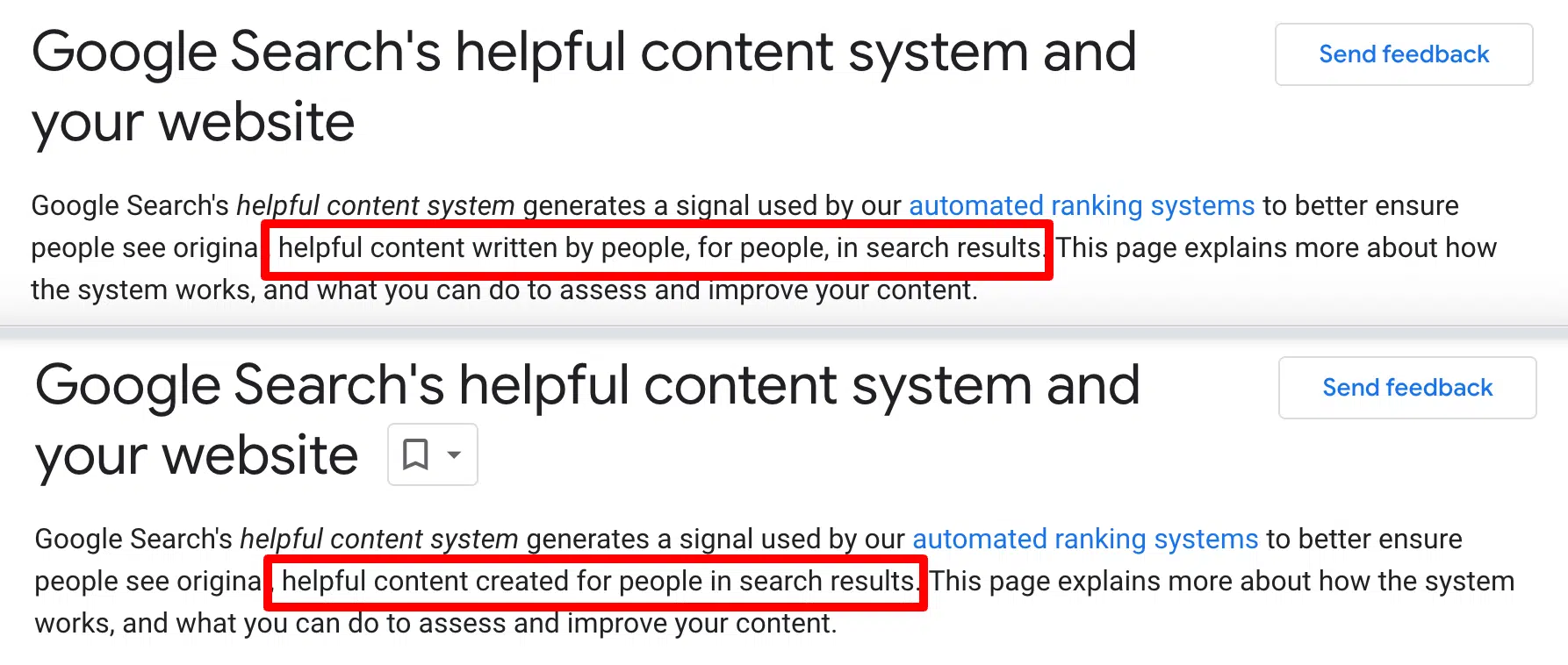The September 2023 Google helpful content update is rolling out as of yesterday at about 4:20 pm ET and while we expect it to continue to roll out for the next two weeks, everyone wants to know what to expect from this update.
Thankfully, Google dropped some clues in its revisions to its search documentation about what has changed with the Google helpful content system.
Let’s dive in.
Improved classifier
When Google announced this update, it mentioned there is an “improved classifier” for the helpful content system. Google wrote, “The September 2023 helpful content update is rolling out with an improved classifier.”
What exactly was improved? That is hard to say but Google did drop more hints.
Hosted third-party content
Google added a new section to its help document on the helpful content update on the topic of hosted third-party content. It reads, “If you host third-party content on your main site or in your subdomains, understand that such content may be included in site-wide signals we generate, such as the helpfulness of content. For this reason, if that content is largely independent of the main site’s purpose or produced without close supervision or the involvement of the primary site, we recommend that it should be blocked from being indexed by Google.”
To be clear, this is not really new advice. In 2019, we reported that Google’s thoughts of hosting third-party content on other sites. “We’ve been asked if third-parties can host content in subdomains or subfolders of another’s domain. It’s not against our guidelines. But as the practice has grown, our systems are being improved to better know when such content is independent of the main site & treat accordingly. Overall, we’d recommend against letting others use subdomains or subfolders with content presented as if it is part of the main site, without close supervision or the involvement of the primary site. Our guidance is if you want the best success with Search, provide value-added content from your own efforts that reflect your own brand.” Google stated in a three-part tweet.
Gary Illyes from the Google Search team added more background on why Google now added this section to the helpful content documentation. “We’ve heard (and also noticed) that some sites “rent out” their subdomains or sometimes even subdirectories to third-parties, typically without any oversight over the content that’s hosted on those new, generally low quality micro-sites that have nothing to do with the parent site. In fact the micro-sites are rarely ever linked from the parent sites, which don’t actually want to endorse these often questionable sites. The only reason the owners of these shady (?) micro-sites rent the sub-spaces is to manipulate search results., he posted on LinkedIn.
Content written by people or machines
Google also removed a few words that clearly reiterated its stance on using AI to help produce content. Google removed the words “written by people” and just wrote “helpful content created for people in search results.”
Here are before and after screenshots:

So humans do not need to fully write the content for that content to be considered helpful according to Google’s helpful content system.
Self-assess your content if hit
If you think this last helpful content update negatively impacted your site, Google said you should self-assess your content. Google added, “If you’re producing helpful content, then you don’t need to do anything; in fact this system may be good for your site, as it is designed to reward helpful content.”
“If you’ve noticed a change in traffic you suspect may be related to this system (such as after a publicly-posted ranking update to the system), then you should self-assess your content and fix or remove any that seems unhelpful,” Google added.
Reviewed by experts
Google updated the creating helpful content document to add “or reviewed” to this line of text “Is this content written or reviewed by an expert or enthusiast who demonstrably knows the topic well?” under the experise questions section.
This again is not new information from Google, Google has been saying it is helpful to have your content reviewed by an expert, if you are not an expert on that topic.
Changing dates of content
One of my personal pet peeves is when sites change the dates or even worse, do not list dates, on their news content. Google added this line “Are you changing the date of pages to make them seem fresh when the content has not substantially changed?” under the avoid creating search engine-first content section.
We see it all the time where sites will make a couple of changes to their content from years ago, update the date, and republish it. This is a common SEO “strategy” that is on Google’s radar.
Adding or removing content for search engines
With the whole CNet debate from a couple of months ago, Google also added this line to that section “Are you adding a lot of new content or removing a lot of older content primarily because you believe it will help your search rankings overall by somehow making your site seem “fresh?” (No, it won’t)”
Be careful when deciding what content to add or remove and think about why are are adding or removing that content.
More to come
In May, Google told us a helpful content system update would be coming this year. Google said this update would enable the helpful content system to “more deeply understand content created from a personal or expert point of view.” Also:
- “We’re also improving how we rank results in Search overall, with a greater focus on content with unique expertise and experience,” Google said a few months ago.
But Google said this is not today’s update:
- “This work is still continuing and is not part of this particular update. We’ll share more about our work in this area in the future,” Google wrote.
So this is not part of the September 2023 helpful content update.
Related stories
New on Search Engine Land
https://searchengineland.com/whats-new-with-the-google-helpful-content-update-431994


